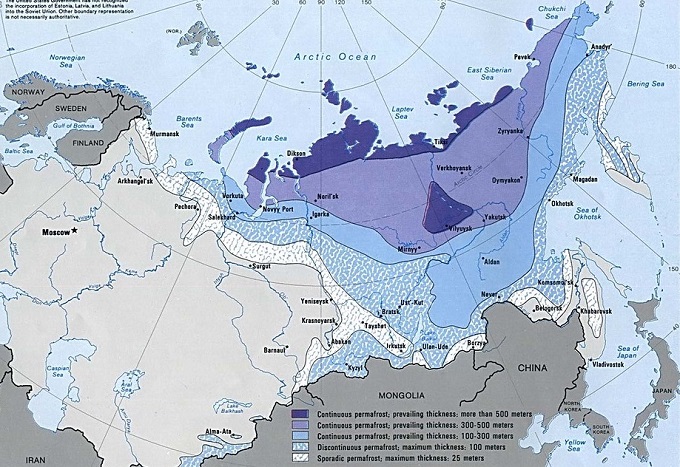Трудовой кодекс

These are large-scale, but not the only evidence of ice accidents. The consequences of the ice tsunami are preserved for millions of years and for tens of thousands of years they change the territories they are under.
How did permafrost come about
Ice tsunamis turn high mountains into sand and freeze the ground hundreds of meters deep. They kill all living things on their way and in the nearest district.

The powerful blows of the Arctic ice for tens of millennia determined the conditions of life and survival on entire continents.
From the fact that the floating ice of the Arctic moved to the mainland, at the north pole did not become warmer. Since the cold at the pole is determined not by the presence or absence of ice there, but by the inclination of the earth's axis to the plane of its orbit.
And the Arctic Ocean soon restored its endless ice fields.
Thus, the ice that keeps the polar cold in itself in the northern hemisphere of our planet has become approximately twice as large. Huge continental territories, covered with "old" ice as a result of an ice tsunami, added to the restored floating polar ice.
Catastrophic cooling in the northern hemisphere of the Earth came almost instantly. The speed of propagation of the known tsunami reaches 700 kilometers per hour. Thus, the polar ice could cover almost the entire territory of Eastern Siberia in just a few hours.
Not only under the ice, but also in its surroundings all the fauna and flora perished. Neither the living had the opportunity to adapt to the cooling or migrate to warmer places.
What is the normal climate on Earth?
In just a few hours, most of the Asian continent plunged into the next ice age, determining the climate on Earth, not only for the past 44 thousand years, but for centuries ahead.
Speaking about climate change on Earth, it is important to choose the right starting point. In other words, what kind of climate in the territories under consideration are we considered the norm.
Modern science, based on exact facts, measurements, and dates, examines changes in the Earth’s climate over a period of time from about the 17th century, when stable meteorological observations and meteorological data collection began, to our days.
Thus, the climate at the beginning of meteorological measurements is taken as the norm, and its changes to present times are called global warming, that is, a kind of deviation from the norm, which causes concern to the world community.
In fact, we have not the slightest reason for the 17th century European climate to be considered the norm for the planet, and now global climate warming is called global only because a thermometer and barometer were invented in the 17th century.
Earth is the planet of dinosaurs
I propose to call normal that climate on Earth, which was before the first known polar ice eruption to the continents. It is logical to consider the ice periods as deviations from the climatic norm, since they are caused by catastrophic events that are not of a systematic nature.
For example, such a norm can be considered the climate that preceded the release of ice in Alaska and Canada about 70 million years ago. This ice strike killed the dinosaurs, just as the Siberian ice tsunami 44 thousand years ago killed the mammoths. The American ice accident left its mark in the form of permafrost to the present day.
If the climate that was on Earth about 70 million years ago is taken as the norm, then we will see that the normal climate was much warmer than the climate today. Dinosaur grazed and bred in today's Canada and Alaska, as evidenced by their mass graves in Alberta, Canada and other northern locations.
Then a series of ice strikes on different shores of the Arctic Ocean — I think that since then there have been no less than three — have greatly cooled the climate of the entire planet. And what we call today "global warming" is nothing more than a return of the Earth's climate to its climatic norm, which prevailed during dinosaur times.
The main driver of the current global warming is the melting of the permafrost in the northern hemisphere, which preserve the memory of the cold of the ancient glaciers that gave rise to them. As the permafrost melts, the planet’s climate will become warmer until it returns to the norm established about 70 million years ago.
I do not know whether it is good or bad, but I know for sure that this is natural and inevitable. And humanity must prepare for the return to the planet of a normal Earthly climate.


